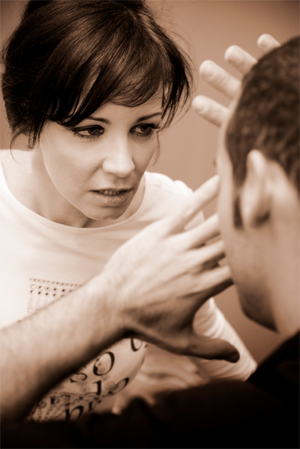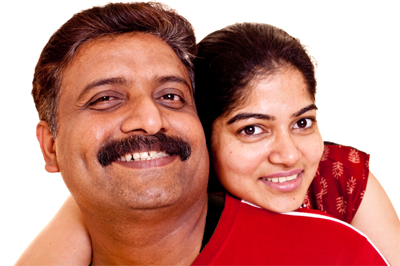
Marriage was the crowning gift given the human race during Creation week. After creating a perfect world, endowed with everything to provide for the health, delight the senses and fascinate the minds of mankind, Yahuwah said, “It is not good that man should be alone; I will make him a helper comparable to him.” (Genesis 2:18, NKJV)
The gift of intimate companionship with one that is “bone of my bones, and flesh of my flesh”1 is a gift unique to the human race. It was not given to the angels nor any of the other unfallen races. It was given for two reasons: 1) to bless the human race by molding the human into the image of the divine; 2) to reveal to all created beings the loving character of Yahuwah.
It was for these reasons that Yahuwah created the human race as two parts of one whole. Both man and woman were created in the image of Elohim: “So . . . [Elohim] created man in his own image, in the image of . . . [Elohim] created he him; male and female created he them.” (Genesis 1:27, KJV)
The union of a man and a woman reveals facets of Yahuwah’s character that would not be understood otherwise. “For this cause shall a man leave his father and mother, and shall be joined unto his wife, and they two shall be one flesh.” (Ephesians 5:31)
The marriage of two people committed to honoring their Maker is a powerful witness in the world. Yahuwah-centered marriages both glorify Elohim and are a blessing to others. Satan knows this and has focused intently upon destroying individual marriages and marriage itself as an institution.
There are many reasons people give for marrying. These vary as widely as the individuals themselves. Some reasons are romantic: She is my soul mate. I am in love with him. Other reasons are practical: Marriage will bring me security. He will be a good provider. Sometimes social pressures influence the decision to get married: I’m pregnant. I’m getting older; if I don’t get married now I may never get married.
Your marriage will only be as strong as the reason why you got married in the first place.
As a result, “your purpose for marrying determines the course of your marriage.”2
The more solid your reason for marrying, the stronger will be your marriage and the more enjoyment you will get from it. Likewise, the poorer your reason for marrying, the greater are your chances of unhappiness and, ultimately, divorce. To have a lasting marriage that is a blessing to both parties, you must have a good reason for getting married. Scripture teaches that only Yahuwah is “good.” Therefore, anything that is good must be consistent with Yahuwah.
The only “good” reason for getting married, then, is that both individuals believe it is Yahuwah’s will for their lives. This does not mean that you can marry who you want and then ask Yahuwah to bless your choice. This means surrendering your will to your Creator and allowing Him to guide you in your selection of a life mate.
Trust in Yahuwah with all your heart, and lean not on your own understanding; in all your ways acknowledge Him, and He shall direct your paths. Do not be wise in your own eyes; fear Yahuwah and depart from evil. If you do this, it will be health to your flesh, and strength to your bones. (See Proverbs 3:5-8.)
 The ultimate goal of joining together in matrimony is for the two of you to become “one flesh.” Even if your original reason for getting married was not a very good one, it is possible to grow beyond that and, with Yahuwah’s blessing, ground your marriage on a solid footing. As the two of you determine to dedicate your marriage to Yahuwah, He will bless your efforts and your union can glorify Him.
The ultimate goal of joining together in matrimony is for the two of you to become “one flesh.” Even if your original reason for getting married was not a very good one, it is possible to grow beyond that and, with Yahuwah’s blessing, ground your marriage on a solid footing. As the two of you determine to dedicate your marriage to Yahuwah, He will bless your efforts and your union can glorify Him.
The principle on which marriage is based is summed up in the words: “Therefore a man shall leave his father and mother and be joined to his wife, and they shall become one flesh.” (Genesis 2:24, NKJV) A couple experiences joy in the marriage in proportion to how melded they are together in “one flesh” under Yahuwah’s blessing. Likewise, the pain and unhappiness experienced are in proportion to the disunion experienced in marriage.
Satan understands this principle and has sought to destroy the happiness of multitudes by leading couples to become “one” in ways that are unhealthy or that are prone to abuse. Gregory L. Jackson has done extensive research into what constitutes true Biblical marriage principles. His research reveals three basic methods widely used by which couples attempt to become “one.” The various methods have greater or lesser strengths and weaknesses, but none are ideal. Only one method, the fourth, is in alignment with other divine principles and will lead to true and lasting happiness.
It is very important to know and understand these methods, because the way you attempt to become “one” will either make or break your marriage. If the right method is used, your marriage will grow stronger and the two of you will grow closer. If the wrong method is used, you and your mate will grow further and further apart as your marriage grows weaker and weaker and weaker.
Jackson illustrates the three wrong methods used by couples to become “one” by using three different mathematical methods to arrive at the number one. These methods are: addition, subtraction and division.
Because a person cannot be represented by zero, the addition method uses fractions to add up to one: ½ + ½ = 1. This model of marriage is used by people who believe that they are not complete unless they have another person in their lives. They believe that in order to be completely loved and fulfilled in life, they must have a life-partner. (While this may be their belief, it is based on a faulty premise because only Yahuwah can provide the fulfillment for which they are longing.)
in their lives. They believe that in order to be completely loved and fulfilled in life, they must have a life-partner. (While this may be their belief, it is based on a faulty premise because only Yahuwah can provide the fulfillment for which they are longing.)
Those who use the addition method are romantics who say things like: How can I live without you? You complete me. I don’t know what I would do without you. You are my everything. While this may sound like “true love,” it cannot accomplish the true Biblical “oneness” that is the desire of human hearts – and is Yahuwah’s desire for His children.
Jackson presents three reasons why the addition method cannot bring a couple into complete oneness:
First, the addition method causes one to depend on the wrong source to feel complete. The word of . . . [Yah] says:
Beware lest any man spoil you through philosophy and vain deceit, after the tradition of men, after the rudiments of the
world, and not after . . . [Yahushua]. For in him dwelleth all the fullness of the Godhead bodily. Ye are complete in him
[Yahushua], which is the head of all principality and power. (Colossians 2:8-10)
The addition method spoils us because it teaches us to depend on someone other than . . . [Yahushua] to feel complete.
Secondly, the addition method causes one to have the wrong purpose for marriage. . . . [Yahuwah’s] purpose for marriage is to develop His image and likeness in us. For those who follow the addition method the purpose for marriage is to feel complete.
Thirdly, the addition method causes one to use the wrong kind of love to relate to his or her spouse. Those who use this method relate to each other with a self-centered, selfish love because their purpose is to get the other to minister to their needs. . . . [Yahuwah’s] love is an other-centered, selfless love because its purpose is to minister to others’ needs.3
Couples who model their marriage after the addition method do so from a mutual need to feel complete. This is problematic because only through Yahuwah can a person feel complete and fully loved. To look to your marriage partner for that is a wrong basis for marriage because it focuses your attention on a human rather than on your Maker. Such love is self-oriented, rather than other-oriented, which is the basis for Yahuwah’s love and for true oneness.
 The subtraction method of becoming one achieves oneness by taking away a smaller number from a higher number: 2 – 1 = 1. Of the three methods in wide use, this is the method that is most prone to abuse and taking advantage of one partner. Couples who use the subtraction method believe that one must dominate the other. Sometimes men use this method to exert control over their wives. They say things like “I wear the pants in this family! I am the head of this house and you must obey me!”
The subtraction method of becoming one achieves oneness by taking away a smaller number from a higher number: 2 – 1 = 1. Of the three methods in wide use, this is the method that is most prone to abuse and taking advantage of one partner. Couples who use the subtraction method believe that one must dominate the other. Sometimes men use this method to exert control over their wives. They say things like “I wear the pants in this family! I am the head of this house and you must obey me!”
This method has also been used by women as an excuse to not think (and study) for themselves. When new light and advanced truths are presented to a woman in this kind of marriage, her response will often be, “My husband is so much better at figuring out that sort of thing. I’ll see what he says.”4
People who use the subtraction method have an over-riding desire to feel powerful. Even those who are the dominated partners in such a marriage have that same desire, which is why they partner with those they believe are powerful; those who will meet that need for them.
Like couples who use the addition method to fulfill a mutual need, couples who use the subtraction method to achieve oneness do so from a mutual need to feel powerful and in control. The subtraction method fails for the same reasons as the addition method: it depends on the wrong source (one’s mate) for meeting the need to feel strong and powerful. Because this is the wrong reason for getting married, the wrong kind of love is exhibited in trying to achieve oneness.
The division method is probably the most popular method used by young people today. Of the three methods, it is the best, although, as will be seen, it is not ideal either.
The addition method comes to the number one by joining two incompletes, the subtraction method comes to the number one by subjecting a lesser to a greater, but the division method comes to the number one by  bringing together two equals. Division teaches, a number divided by an equal number will result in the number one. For example, 4 ÷ 4 = 1. Married couples who use the division method believe marriage should be a union of equals. They do not need marriage to feel complete or powerful and in control. They are self-reliant people with a healthy self-concept. They are not opposed to the idea of marriage, but they feel they can survive and find happiness without it. The idea of marriage is appealing to them when it offers a way to be an equal partner in life with someone who has the same economic and educational goals (Some add spiritual goals to the list.). They believe the best way to come to the number one is by bringing two equals together.5
bringing together two equals. Division teaches, a number divided by an equal number will result in the number one. For example, 4 ÷ 4 = 1. Married couples who use the division method believe marriage should be a union of equals. They do not need marriage to feel complete or powerful and in control. They are self-reliant people with a healthy self-concept. They are not opposed to the idea of marriage, but they feel they can survive and find happiness without it. The idea of marriage is appealing to them when it offers a way to be an equal partner in life with someone who has the same economic and educational goals (Some add spiritual goals to the list.). They believe the best way to come to the number one is by bringing two equals together.5
Although the division method may be the best of the three types of marriage models, it still fails for the same three reasons as the previous two: it looks to the wrong source for feeling like an equal, thus it has the wrong reason for getting married and as a result, the wrong kind of love is expressed in this marriage.
The very best method for achieving the desired oneness in marriage is by using the exponential model to arrive at one. In exponential marriage, as in exponential math, two numbers are joined together in such a way that the overall value of both is increased and enhanced.
Addition: ½ + ½ = 1
Subtraction: 2 – 1 = 1
Division: 2 ÷ 2 = 1
[I]n exponential math one is raised to the power of two. In every other mathematical method the number one is either lessened or duplicated by the number to which  it relates, but in exponential math the number one is increased by the number to which it relates. It is not increased in numerical value; it is increased in its power. When you look at it you see the number one, but when you feel its impact you feel the number two. It is one that has the power of two. [Yahuwah’s] method of becoming one is two complete people joining to form a greater one. They move through life as one, but their impact on life has the power of two. When two become one as [Yahuwah] intended, life does not get worse, neither does it remain the same; it gets better.
it relates, but in exponential math the number one is increased by the number to which it relates. It is not increased in numerical value; it is increased in its power. When you look at it you see the number one, but when you feel its impact you feel the number two. It is one that has the power of two. [Yahuwah’s] method of becoming one is two complete people joining to form a greater one. They move through life as one, but their impact on life has the power of two. When two become one as [Yahuwah] intended, life does not get worse, neither does it remain the same; it gets better.
In order for the exponential model of oneness to work, both spouses must be complete or whole before they become one. They cannot come to the relationship to receive; they must come to give. Each must bring his or her particular talents and strengths to the marriage. Each must recognize, appreciate, and surrender to the talents and strengths of the other. Also, each must be willing to give of their talents and strengths for the good of the marriage no matter what the personal sacrifice.
Those who use the addition model fall short of [Yahuwah’s] oneness because they focus more on receiving than giving. Even when they give, it is because they want to receive. Those who follow the subtraction model fall short of [Yahuwah’s] oneness because they do not recognize, appreciate, and surrender to the talents and strengths of the other. Those who follow the division model fall short of [Yahuwah’s] oneness because they are not willing to give of their strengths and talents in a sacrificial and selfless manner. The exponential model is the only one that brings out the ingredients necessary to become one the way [Yahuwah] intended. It accomplishes this because it is the only one that fits [Yahuwah’s] purpose for marriage.6
A Bible text that is frequently taken out of context to support a wrong method for becoming one, is: “Wives, submit yourselves unto your own husbands.” (Ephesians 5:22) There are some who believe that even if the husband requires the wife to do something that is morally or legally wrong, she must obey and her husband will be held responsible for the sin. 
The use of this text is most widely used among couples who use the subtraction and addition methods for oneness. Those who use the division method typically reject this text as being nothing more than Paul’s personal opinion based on the social ideas of the times in which he wrote. However, the typical way this text is interpreted is not supported by the context of the passage and it certainly should not be rejected based on a misinterpretation of the verse.
A common assumption is that Scripture commands wives to “submit” to their husbands, while only commanding husbands to “love” their wives. This inequity has opened the door to a great deal of abuse as well as resentment. Wives want to believe that their husbands love them, so they labor under a heavy burden of thinking that they are sinning when they resent having to “submit,” while all their husbands have to do is just “love.”
The correct understanding of this text can only be found when using the exponential model of becoming one. The two texts that create the most confusion are:
Wives, submit yourselves unto your own husbands, as unto Yahuwah.
Husbands, love your wives, even as Yahushua also loved the ekklesia, and gave Himself for it. (See Ephesians 5:22 and 25.)
Wives are to submit themselves to their husbands as unto Yahuwah. Yahuwah never asks anyone to do something morally or legally wrong. In fact, Yahuwah  never forces anyone to do anything against his/her will. And this is what is revealed in the instruction to husbands: love your wives just as Yahushua loved the ekklesia and died for it! Most women would be quick to say, “My husband loves me enough to die for me!” Every woman wants to believe this of her husband. But that is not what the text means.
never forces anyone to do anything against his/her will. And this is what is revealed in the instruction to husbands: love your wives just as Yahushua loved the ekklesia and died for it! Most women would be quick to say, “My husband loves me enough to die for me!” Every woman wants to believe this of her husband. But that is not what the text means.
Yahuwah guarantees freedom of choice to all. When Adam and Eve sinned, their natures, which had been made like Yahuwah’s, became warped and subject to Satan. Adam and Eve and all of their descendants after them would have remained helpless soul-slaves of Satan – IF Yahuwah had not pledged His Son to die for sinners to give them a second chance to choose.
Note: Yahushua’s death on the cross does not force anyone to be saved against their will. Yahushua’s death freed the will of everyone so that they could choose for themselves whom they would serve: Yah or Satan. In other words, the way in which Yahushua loved the ekklesia was to guarantee her freedom of choice – even though that freedom of choice allowed people to reject Him all over again.
A man who loves his wife as Yahushua loved the ekklesia will never force his wife to do something she does not want to do. If he truly loves his wife like Yahushua loves the ekklesia, he will be willing to die to protect his wife’s freedom of choice – even if he disagrees with her choice! That is loving one’s wife “even as Yahushua also loved the ekklesia and gave Himself for it.”
Under the exponential method of becoming one, it is safe for women to “submit” to their husbands, showering upon him the other-centered, selflessly giving love that finds its home in the heart of the Creator. Likewise, such  Yah-like agape love is returned to the wife when the husband loves her with the same selfless devotion that Yahushua showed when He gave His life to guarantee freedom of choice for sinners.
Yah-like agape love is returned to the wife when the husband loves her with the same selfless devotion that Yahushua showed when He gave His life to guarantee freedom of choice for sinners.
Couples who use the exponential method of becoming one forge a very strong bond because of Yahuwah’s love. They are not bound by a need to feel complete, or powerful, or in control or even by the need to feel equal. Their marriage is strong because it is based on both of them selflessly giving for the good of the other. The more each one selflessly gives for the good of the other, the more “they two become one” and the happier they both become.
Such love is the strongest of all because it is Yah-centered love. Its highest joy is in giving, generously and self-forgetfully, to the other. It makes no demands of the other, but is willing to sacrifice all for the greater good of the other and of the marriage. Thus, even submission is seen as a benefit because it is viewed in the light of allowing one’s wife or husband to use her or his Yah-given talents for the greater good of the marriage, thus meeting the needs of both. Submission does not make one feel less equal, because it is based on choice. Each individual thus enhances the marriage by using his/her individual gifts and talents. The couple as “one” can both appreciate the role of the other in the marriage and the relationship as a whole benefits.
 It must be understood, however, that even the best model of marriage will only work if both partners are individually committed to Yahuwah. Only when the husband and the wife are both having their personal needs met in their Creator, when both, in turn, love each other with the self-less, self-sacrificing love of Yahuwah, will the marriage be successful. This can be achieved only through daily surrender to Yahuwah; by bringing the will, the thoughts and emotions, the hopes and dreams into conformity to Him.
It must be understood, however, that even the best model of marriage will only work if both partners are individually committed to Yahuwah. Only when the husband and the wife are both having their personal needs met in their Creator, when both, in turn, love each other with the self-less, self-sacrificing love of Yahuwah, will the marriage be successful. This can be achieved only through daily surrender to Yahuwah; by bringing the will, the thoughts and emotions, the hopes and dreams into conformity to Him.
A person who seeks to base his/her marriage on the exponential model when the spouse is using one of the other three will find that he/she is taken advantage of and will end up feeling used. This brings us back full circle to what was stated at the beginning of the article: the only reason a person should get married is if he/she knows that it is Yahuwah’s will. “When your purpose for getting married is not based on how you feel or what you think, but rather on the desire to do what you believe to be [Yahuwah’s] will for your life, then your decision for divorce is more likely to be based on the same thing.”7
The only safe course for anyone, single or married, is to individually seek to follow Yahuwah’s will in one’s own life. Whether you are engaged or only thinking about getting married, whether you are in a good marriage or a bad one, if you will surrender your will to your Maker, He will guide you in safe paths.
Trust in Yahuwah with all thine heart; and lean not unto thine own understanding. In all thy ways acknowledge Him, and He shall direct thy paths. (See Proverbs 3:5, 6.)
Yahuwah’s promise for you and your marriage is:
For I know the thoughts that I think toward you, saith Yahuwah, thoughts of peace, and not of evil, to give you an expected end. (See Jeremiah 29:11.)

________________________________________________________
1 Genesis 2:23
2 Gregory L. Jackson, How Surrender Makes Marriage Happier, Divorce a Blessing, the Single Life Fulfilling, p. 18. The authors gratefully acknowledge Mr. Jackson’s research. The concepts in this article are drawn largely from his book.
3 Jackson, pp. 39-40.
4 This mindset carries over into their relationship with their ministers, too. Instead of studying Scripture for themselves, many are content to go with whatever their pastor claims is truth, regardless of the accumulation of evidence to the contrary.
5 Jackson, pp. 41-42.
6 Ibid., pp. 43-44.
7 Ibid., p. 18, emphasis original.